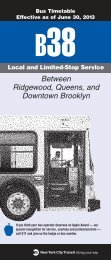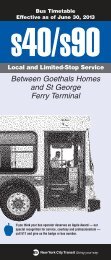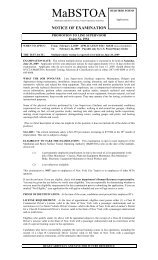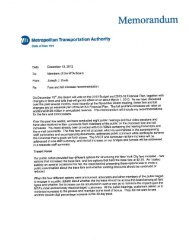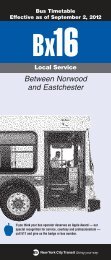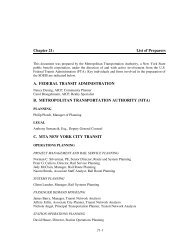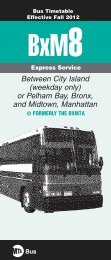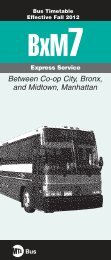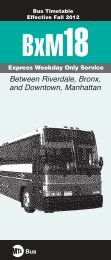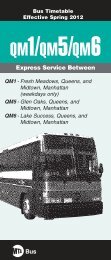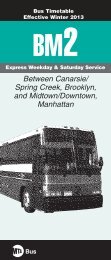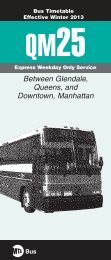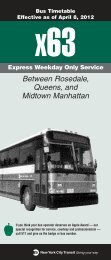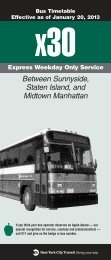Greening Mass Transit & Metro Regions: The Final Report - MTA
Greening Mass Transit & Metro Regions: The Final Report - MTA
Greening Mass Transit & Metro Regions: The Final Report - MTA
Create successful ePaper yourself
Turn your PDF publications into a flip-book with our unique Google optimized e-Paper software.
24<br />
Existing Fleet – Retrofit<br />
(overhaul eligible)<br />
4,886 cars<br />
New Cars – designed<br />
but not yet built<br />
(R160 Opt 2) 382 cars<br />
New Cars –<br />
not yet designed (R179,<br />
R188) 1,530 cars**<br />
Lightweighting<br />
Technology<br />
Energy Impact<br />
(kWh)<br />
Key Takeaway<br />
<strong>The</strong> greatest annual energy savings is not necessarily<br />
the most cost efficient<br />
Key Takeaway<br />
3,988,604<br />
Other benefits, such as operational and safety<br />
improvements, can occur with these modifications in<br />
addition to weight savings<br />
Maximum Achievable Energy Savings by Fleet Groups<br />
Regeneration Lightweighting<br />
(Assumes perfect regeneration using a full 12kWh on-board)<br />
Energy Savings: 384,084,000 kwh<br />
CO2 Avoided: 165,156,120 kg<br />
Cost:* $23.3 M<br />
Note:* only 2,270 cars regen capable<br />
Energy Savings: 64,634,400 kwh<br />
CO2 Avoided: 27,792,792 kg<br />
Cost:* $3.9 M<br />
Energy Savings: 258,876,000 kwh<br />
CO2 Avoided: 111,316,680 kg<br />
Cost:* $15.7 M<br />
Costs are expressed as differential cost, defined as the increased cost necessary to achieve the desired savings beyond costs that would be incurred regardless. For regeneration,<br />
differential cost is equal to procurement cost since it is a new system addition to the fleet.<br />
*Regeneration Cost represents the recurring cost to replace the rechargeable batteries every 2 years due to extremely high cycling that occurs in an urban transit system.<br />
Lightweighting cost represents the differential cost and does not have an associated recurring cost metrics such as cost, CO2, or energy savings.<br />
**Note: R188 class “new cars” are actually composed of 386 new chassis, and 120 R142a up-converted chassis; however this does not materially impact key performance.<br />
Potential Annual Energy Impact by Lightweighting Innovations–Assume All Overhaul-Eligible and New Cars (R160 0p, R179, R188)<br />
4,491,429<br />
6,055,794<br />
7,514,128<br />
Energy Savings: 24,092,235 kwh<br />
CO2 Avoided: 10,359,661 kg<br />
Cost:* $20.9 M<br />
Note: Avg 1,440 lb per car savings<br />
Energy Savings: 2,709,009 kwh<br />
CO2 Avoided: 1,164,874 kg<br />
Cost:* $2.8 M<br />
Note: Avg 2,144 lb per car savings<br />
Energy Savings: 16,092,136 kwh<br />
CO2 Avoided: 6,919,619 kg<br />
Cost:* $11.9 M<br />
Note: Avg 3,203 lb per car savings<br />
12,546,308<br />
Composite instead of plymetal panel flooring<br />
Giga cell battery with alternative battery box<br />
Utilize Oilless Compressor concepts<br />
Corrugated wheels / Lightweight wheels<br />
Utilize single draft gear (tube style) link bar<br />
One free axle on 1 non-motorized truck replacing OSMES<br />
Gear unit with lowest weight<br />
Lightweight floor pans<br />
Eliminate OSMES, brackets and equipment<br />
Eliminate flip up seats<br />
Eliminate secondary center collision posts<br />
Trip cock linkage weight reduction<br />
Eliminate 1 of 2 coupler adapters on NMTs units<br />
Reduce weight of coupler guides on type 1 truck<br />
Reduce heater grill weight<br />
Reduce advertisement card clips weight<br />
<strong>The</strong> full version of this report can be viewed online at www.mta.info/environment.<br />
TOTAL<br />
42,685,643<br />
kWh



